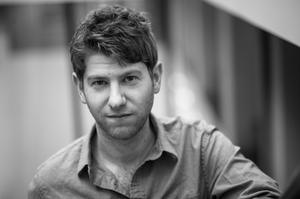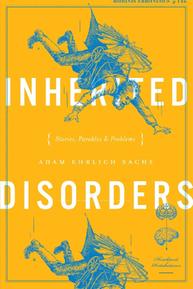
|
|
| photo: Lulu Liu | |
Adam Ehrlich Sachs is the author of Inherited Disorders: Stories, Parables & Problems (Regan Arts, May 3, 2016). He studied atmospheric science at Harvard, where he wrote for the Harvard Lampoon. His fiction has appeared in the New Yorker, n+1 and McSweeney's, among other places. He lives with his wife in Somerville, Mass.
On your nightstand now:
At the risk of looking incredibly pretentious, I'll answer this truthfully: Proust's Sodom and Gomorrah, Cervantes's Don Quixote, Sextus Empiricus's Outlines of Scepticism, Rachel Lichtenstein's and Iain Sinclair's Rodinsky's Room, and Augustine's Confessions. It's a very aspirational nightstand. My only defense is that most of these books have been sitting there an extremely, even a pathetically, long time.
Favorite book when you were a child:
Shel Silverstein's The Giving Tree. Apparently I wrote Silverstein a letter asking him to change the ending to something less sad. He didn't, and now the only stories I'm able to write involve people dying, going crazy or exploiting other people until they're reduced to (metaphorical) tree stumps. Tragic, depressing stump fiction.
Your top five authors:
Franz Kafka, Thomas Bernhard, Jorge Luis Borges, Vladimir Nabokov. Fifth place rotates (depending on whom I'm talking to and what I'm trying to prove about myself) among Samuel Beckett, Lydia Davis, Gert Hofmann, Muriel Spark and many others.
Book you've faked reading:
I made it through 950 pages of Tolstoy's War and Peace before giving up with 250 pages left to go. Now I usually claim to have read it, but with profound ethical misgivings. This is complicated by the fact that my wife is a Tolstoy scholar.  Book you're an evangelist for:
Book you're an evangelist for:
Nicholson Baker's House of Holes. Some reviewers spurned it, but I think it's one of the funniest books ever written. There's this Wittgenstein line I like: "Never stay up on the barren heights of cleverness, but come down into the green valleys of silliness." I think most supposedly "funny" books turn out to be clever rather than silly. But Baker leads his characters down into the green valleys of silliness and has them engage in unbelievable acts of fornication there.
Book you've bought for the cover:
Peter Mendelsund's brilliant editions of Kafka.
Book you hid from your parents:
I've hidden things from my parents--career ambitions, psychological issues, prolonged periods of insomnia, fears about their mortality--but never a book.
Book that changed your life:
Nietzsche's essay "On the Uses and Disadvantages of History for Life" in his Untimely Meditations, which, as I understood it, instructed me to quit grad school immediately. I am extremely grateful to it.
Favorite line from a book:
"We study a monumental work, for example Kant's work, and in time it shrivels down to Kant's little East Prussian head and to a thoroughly amorphous world of night and fog, which winds up in the same state of helplessness as all the others, he said, I thought." --from Thomas Bernhard's The Loser. I consult this sentence whenever I need to remind myself of the complete absurdity and futility of writing and of all other human endeavors.
Five books you'll never part with:
Bernhard's Woodcutters. Beckett's Watt. Nabokov's Pale Fire. Kafka's Complete Stories. Proust's In Search of Lost Time (even though I've been stalled on the fourth volume for a year).
Book you most want to read again for the first time:
The Giving Tree, ideally the corrected version in which the stump suddenly (somewhat inexplicably) regrows her entire trunk, her branches and especially her apples. The boy then uses these things in moderation (e.g., not cutting off all of her branches when needing to build his house, etc.).

